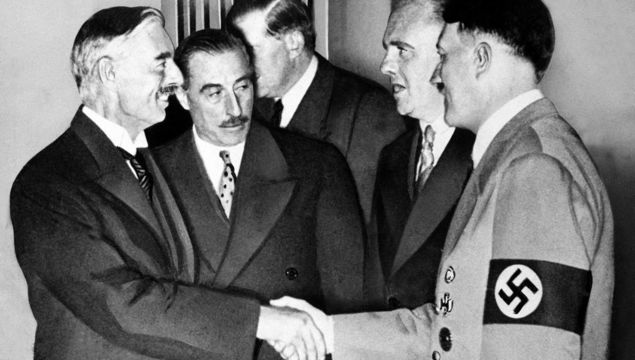
September 30, 1938: British Prime Minister Neville Chamberlain shakes the hand of Adolf Hitler in Munich. Public Domain
Sadly British Prime Minister Neville Chamberlain is probably best known for returning from Munich in Sept 1938, uttering those famous words, "I believe it is peace for our time," upon returning from a meeting with Adolf Hitler.
British Prime Minister Neville Chamberlain's statement marked a pivotal moment in history, as Chamberlain's pursuit of appeasement with Nazi Germany set the stage for one of the darkest chapters in the 20th century. This article will explore why Chamberlain believed in the Munich Agreement, what transpired next, and the enduring legacy of his actions.
In the late 1930s, Europe was on the brink of war. Hitler's expansionist ambitions were causing alarm, particularly his demands for the Sudetenland, a German-speaking region of Czechoslovakia. Fearing the outbreak of a catastrophic war, Chamberlain embarked on a policy of appeasement, hoping to placate Hitler's territorial ambitions and avoid a conflict. The Munich Agreement, signed on September 30, 1938, allowed Germany to annex the Sudetenland in exchange for Hitler's promise not to make any further territorial demands in Europe.
Chamberlain's belief in the Munich Agreement stemmed from several factors:
Fear of war: Chamberlain, like many in Europe, was deeply scarred by the memories of World War I, and he was determined to avoid another devastating conflict at any cost. He genuinely believed that appeasement could prevent war.
Public opinion: Chamberlain was acutely aware of the British public's war weariness. The horrors of World War I were fresh in the public's mind, and they were reluctant to support another war. Chamberlain's policy of appeasement was popular among the British populace.
Trust in diplomacy: The Prime Minister placed his faith in diplomacy and believed that through negotiation and compromise, lasting peace could be achieved. He hoped that Hitler's word and the Munich Agreement would bring stability to Europe.
The grim reality: Unfortunately, Chamberlain's optimism was misplaced. Hitler's promises proved empty, and less than a year after the Munich Agreement, Nazi Germany violated its terms by occupying Czechoslovakia. The world had witnessed the futility of appeasement, and the path to war was now inevitable.
Neville Chamberlain's legacy is one of controversial leadership. In hindsight, he is often criticized for his policy of appeasement, which is seen as enabling Hitler's aggression and delaying the inevitable conflict. His statement about "peace for our time" has become a symbol of political naivety.
Chamberlain's actions in the lead-up to World War II are seen as a cautionary tale in international relations. Critics argue that appeasement emboldened Hitler and allowed him to build his military might unchecked, ultimately leading to a more destructive war. However, some defenders argue that Chamberlain bought valuable time for Britain to rearm and prepare for the war that was bound to come.
Neville Chamberlain's belief in the Munich Agreement as a path to peace in 1938 was a well-intentioned but ultimately misguided effort to prevent another world war. History has judged him harshly for his appeasement policy, but it serves as a reminder of the complexities and challenges faced by leaders in times of crisis. Chamberlain's legacy remains one of controversy and debate, highlighting the importance of learning from the past to avoid repeating the mistakes of history.





Comments